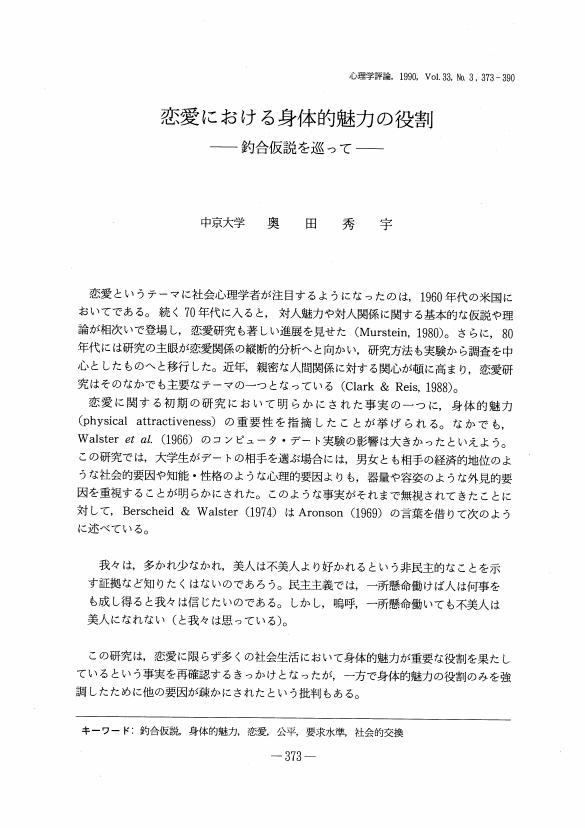2 0 0 0 OA 恋愛における身体的魅力の役割 ――釣合仮説を巡って――
- 著者
- 奥田 秀宇
- 出版者
- 心理学評論刊行会
- 雑誌
- 心理学評論 (ISSN:03861058)
- 巻号頁・発行日
- vol.33, no.3, pp.373-390, 1990 (Released:2019-07-24)
1 0 0 0 OA 報酬の分配意見が対人魅力に及ぼす効果
- 著者
- 奥田 秀宇
- 出版者
- 公益社団法人 日本心理学会
- 雑誌
- 心理学研究 (ISSN:00215236)
- 巻号頁・発行日
- vol.55, no.1, pp.22-28, 1984-04-30 (Released:2010-07-16)
- 参考文献数
- 24
The purpose of the present study was to examin the reactions (favorable or unfavorable) of the subjects toward another who expressed an opinion favoring either equal or equitable reward allocation for work performed in a hypothetical situation. There were 88 subjects in Exp. 1 and 60 in Exp. 2. In both experiments, the subjects were asked their reactions toward another who expressed an opinion on reward allocation. The results suggest that when a person expressed an opinion about a reward which would accrue to himself, the reactions of the subjects toward him depended upon the degree to which he agreed to sacrifice his own gain. When the opinion was unrelated to his own reward, the person who supported equal allocation was liked but who supported equitable allocation was disliked. Whether the opinion about allocation was similar to that of the subjects had no effect on their reactions toward that person expressing the opinion.
1 0 0 0 OA 態度の重要性と仮想類似性
- 著者
- 奥田 秀宇
- 出版者
- The Japanese Group Dynamics Association
- 雑誌
- 実験社会心理学研究 (ISSN:03877973)
- 巻号頁・発行日
- vol.33, no.1, pp.11-20, 1993-07-20 (Released:2010-06-04)
- 参考文献数
- 32
- 被引用文献数
- 1 1
本研究は, 態度の類似性と対人魅力の関係が, 態度の重要性によって影響を受けるかという点に関して検討した。従来の研究によれば, 重要態度と非重要態度の類似度が異なる場合にのみ重要性の効果が生じ, それ以外の場合には態度の重要性は類似性と魅力の関係に影響を及ぼさないことが知られている。その理由として, 仮想類似性が対人魅力を媒介することが考えられる。男女大学生148名 (実験1) および女子看護学生68名 (実験2) は, 重要態度および非重要態度の類似・非類似な他者に対する対人魅力と仮想類似性について回答した。その結果, 対人魅力は重要類似条件において最も高く, 非重要類似条件において最も低かった。重要態度のみの条件と非重要態度のみの条件では対人魅力に差はなかった。同様の結果は, 仮想類似性についても得られた。しかし, 仮想類似性が対人魅力を媒介するという仮説は支持されなかった。
1 0 0 0 分配行動と対人魅力に及ぼす状況・性差・文化的要因の効果
- 著者
- 奥田 秀宇 沙 蓮香
- 出版者
- 日本社会心理学会
- 雑誌
- 社会心理学研究 (ISSN:09161503)
- 巻号頁・発行日
- vol.6, no.1, pp.33-41, 1990
The present study explored the effects of cooperative or competitive situations, sex differences, and the cultural differences between Japan and China on the allocation choices of a reward, and the effects of these variables on interpersonal attraction for allocators. Eighty male and fourty female undergraduate students in both countries answered the question which asked the subjects' own allocation choices and the liking for allocators, after they read the description of a game situation. The game was either group or individual task, and the allocators chose either equal or equitable allocation. The results suggested that there were differences between both countries in the subjects' own allocation choices, while there were similar tendencies between them in the liking for allocators. In both, interpersonal attraction is affected by both altruism and fairness of the allocators, and fairness judgment is affected mainly by allocation similarity.
